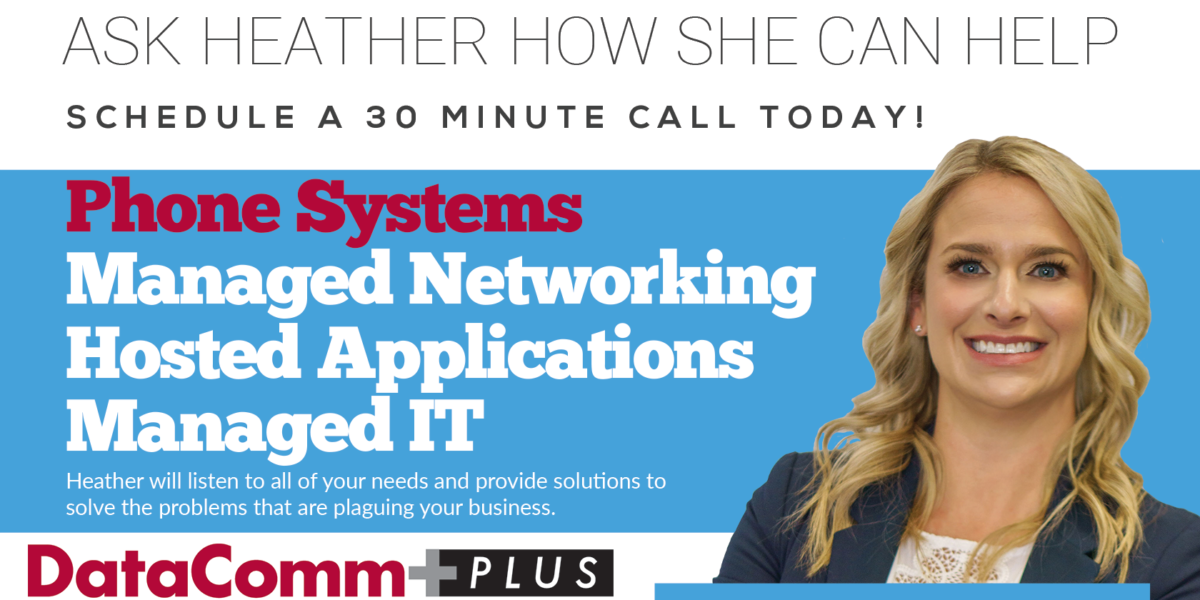DataComm knows that it’s intimidating to switch technology. Many of our long-term clients previously had on-premise phone systems. This meant the “brains” were onsite and hosted with them. Most phone systems today are fully hosted VoIP (Voice over Internet Protocol) systems, which is the term for when phone calls are placed and received over the Internet and the “brains” are hosted elsewhere. In our case, we own the infrastructure where our “cloud VoIP” system is hosted in our data center in Franklin, WI.
A VoIP-type of phone system scenario allows for flexibility, security, redundancy and access that most organizations consider critical to success in the 21st century. It also means that you would not have as much upfront hardware cost/investment in a server that you will most likely have to replace in roughly seven years. (Sorry, the days of you having a phone system that operated for 15-20 years is a thing of the past, as many solutions have become more software centric than hardware centric.)
However, do know there are some very specific situations or limitations for your business in which an on-premise phone system might be the only way to go. Having said that, DataComm does still offer on-premise IP phone system solutions that keeps us competitive where other phone system providers might just say “no.”
This does mean that you and your existing IT vendor or onsite IT person need to keep in mind and be aware of the following items to ensure you meet the requirements for a successful on-premise IP phone system deployment. Keep in mind that Datacomm Plus is a full-service network infrastructure provider, so we can help ensure you meet them if you run into problems with your existing IT.
On Premise Phone System Requirements
- A fast, low latency Internet connection with no filtering for SIP traffic
- Full control over your firewall, all network equipment and Internet connection
- Business-class equipment throughout the entire network
- Backup battery unit with the ability to safely power down your phone system
- A clean, secure location to place the equipment
- At least one static public IPv4 address
- The ability to pass SIP and other types of traffic over your network without disruption
- The ability to accommodate Datacomm’s remote management equipment
A second scenario exists where you, for some reason, need to bring your own phone lines to the solution. DataComm usually in all cases requires the phone lines (SIP trunks) to be managed by us for proper 911 requirements. In the slim to rare instance we are not capable of taking over this service for you, this is what you have to confirm you have complete control over when working with another phone line provider.
Please note that the control and maintenance of 911 locations often requires costly monthly additions from “the big” phone line providers, you should check with the phone line carrier you’re working with so you are not caught with slap on fees you were not aware of.
Bring Your Own Voice Service Requirements
- Full control over your phone service/lines in order to make changes and/or request support from your provider as needed
- Either the ability to define multiple unique 911 locations on demand OR SIP service from us to allow FCC compliant 911
- Procedures from your carrier and local fire/police describing how you should test 911 during deployment of your new phone solution.
Again, while most clients should always be gravitating toward a fully-managed VoIP system where we handle the “brains” of your system and the phone lines, we understand not every situation is perfect. DataComm can still help you if you have limitations that do not allow for that type of setup.
Make sure you have in-depth conversations with your IT department or consultant regarding these recommendations or contact us at sales@datacommplus.com. We can help with your network and phone system to ensure a smooth deployment.




